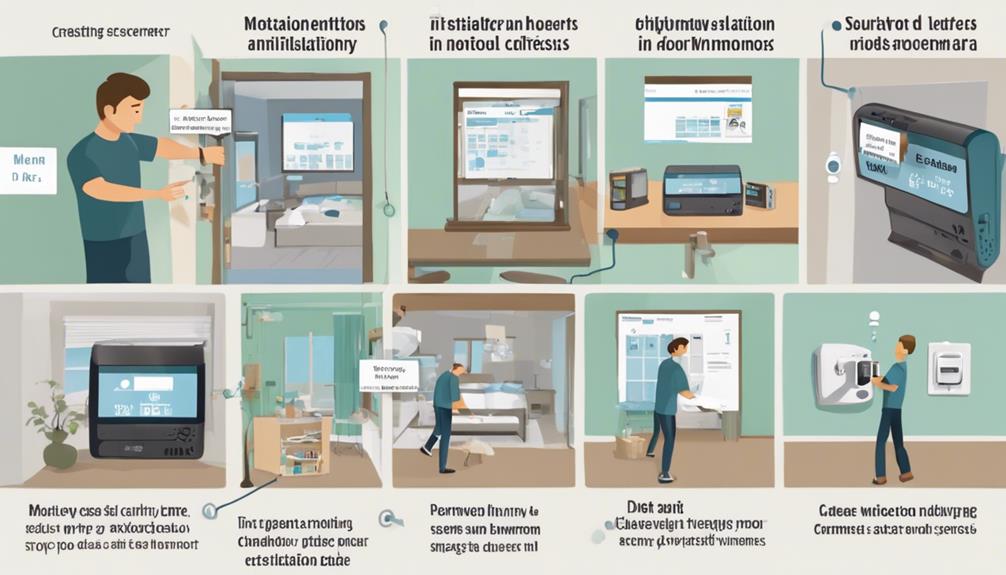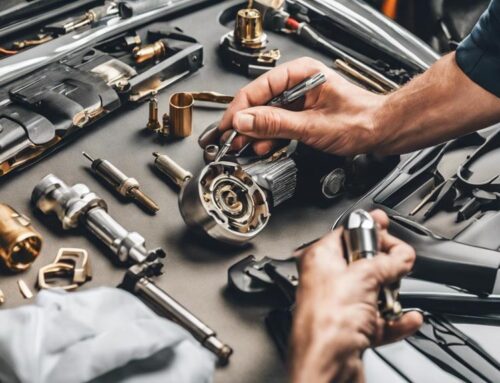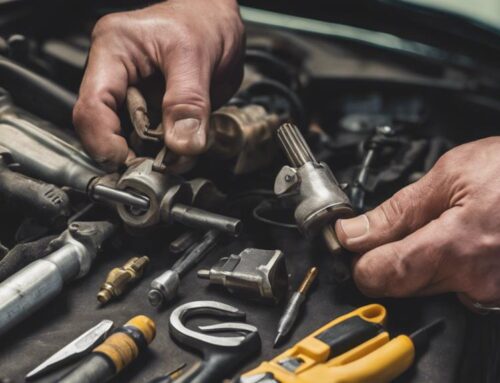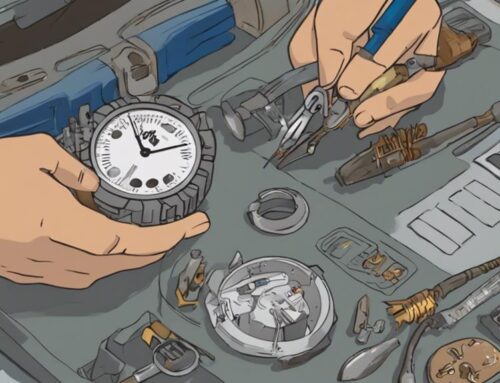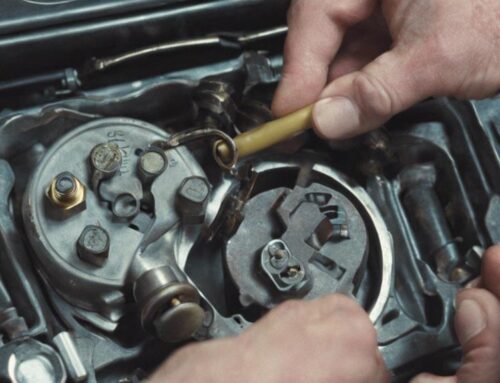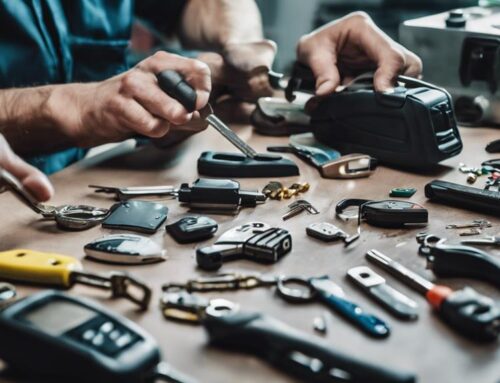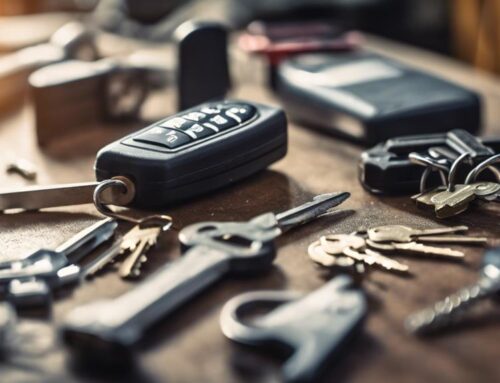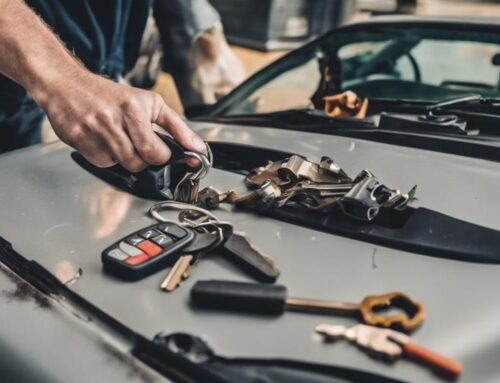To maintain your security system effectively and guarantee a prolonged lifespan, conduct regular inspections and essential maintenance tasks. Test alarm functionality to verify breach detection and responsiveness, keeping sensors sharp against threats. Clean camera lenses and adjust resolution settings for clear footage and improved surveillance. Follow a battery replacement schedule every 3-5 years, checking for signs like beeping or dimming lights. Understanding typical lifespans of alarms (5-10 years) and cameras (5-10 years) guides maintenance and upgrades for peak performance. Proactive measures and staying updated on security advancements contribute to extending the longevity of your system.
Key Takeaways
- Conduct regular inspections and testing to ensure system functionality.
- Clean and adjust cameras for optimal performance and longevity.
- Replace batteries every 3-5 years to maintain power reliability.
- Monitor technology advancements for extended security system lifespan.
- Invest in professional installation and upgrades for prolonged effectiveness.
Importance of Regular Inspections
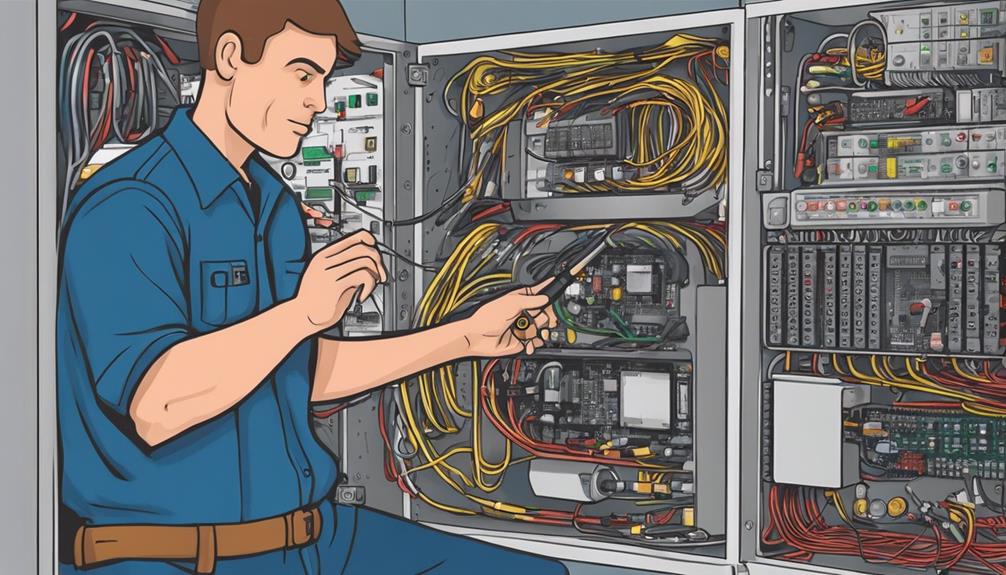
Regular inspections are essential for maintaining the effectiveness and functionality of your security system. It's like giving your system a check-up to catch any potential issues before they become major problems. Setting up regular maintenance schedules guarantees that your security system stays in excellent condition. During these inspections, technicians can identify areas that may need security system upgrades to keep up with the latest technologies and security standards. By staying on top of maintenance, you not only prolong the lifespan of your system but also enhance its overall performance. Remember, a well-maintained security system is a happy security system – and a happy you knowing your property is well-protected! Additionally, visible security features deter ~60% of burglars from targeting protected homes Understanding The Basics Of Residential Security Systems.
Updating System Software
To guarantee ideal performance and security efficacy, it is imperative to regularly update the software of your security system. Software updates are vital in guaranteeing that your system is equipped with the latest features, bug fixes, and security patches. These updates not only enhance the overall functionality of your security system but also address any vulnerabilities that could be exploited by malicious actors. When updating your system software, always verify compatibility with your existing hardware and other devices to prevent any potential issues. Remember, staying current with software updates is like giving your security system a regular dose of vitamins to keep it healthy and robust. So, don't forget to keep those updates rolling in for a secure and reliable defense mechanism! Regular updates guarantee the system remains effective
Testing Alarm Functionality
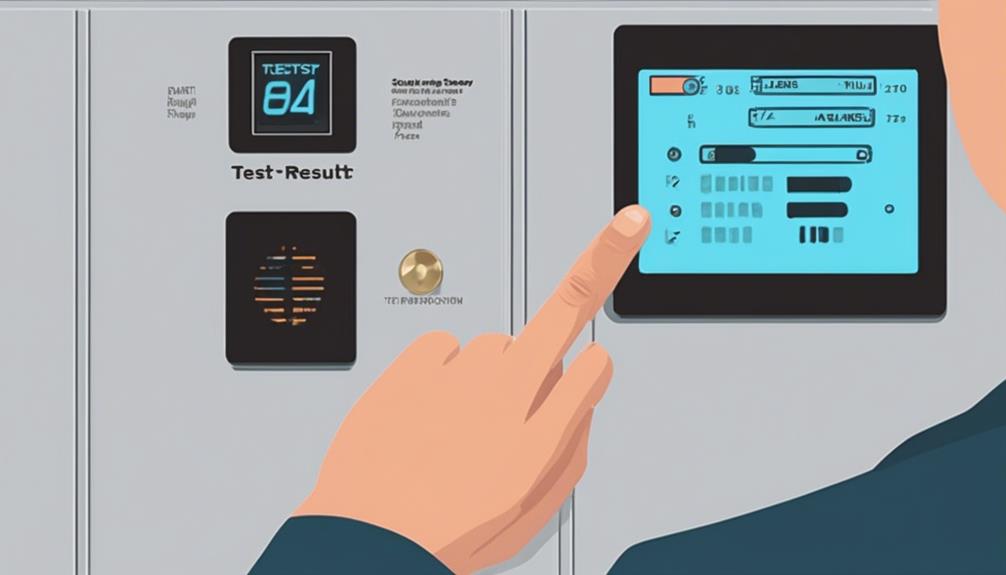
When verifying the best functionality of your security system, a critical aspect to focus on is testing the alarm functionality. Start by checking the sensor functionality; confirm they are properly detecting any movements or breaches. Next, test the alarm responsiveness by triggering a test alarm. Verify that the alarm system promptly notifies you through the designated channels, such as your phone or a monitoring service. It's important to conduct these tests regularly to guarantee that your security system is always ready to protect your home. Remember, a security system is like a superhero – it needs to be in top shape to save the day! So, keep those sensors sharp and alarms loud to ward off any potential threats.
Checking Camera Quality
When evaluating the quality of your security cameras, it is vital to begin by inspecting the cleanliness of the camera lenses. Over time, dust and debris can accumulate, affecting the clarity of the footage. Additionally, verify the image resolution is set at an ideal level to capture clear and detailed visuals of your surroundings. Regular maintenance of these aspects will enhance the overall effectiveness of your security system.
Camera Lens Cleaning
Inspecting and cleaning your security camera lenses is essential for maintaining peak camera quality. Different lens types like fixed, varifocal, and zoom lenses require specific cleaning techniques to guarantee maximum performance. Start by using a soft brush to remove any loose dirt or debris from the lens surface. Then, gently wipe the lens with a microfiber cloth dampened with a lens cleaning solution or isopropyl alcohol. Avoid using harsh chemicals or abrasive materials that could scratch the lens. For stubborn smudges, breathe lightly on the lens to create moisture before wiping. Regular lens cleaning not only improves image clarity but also extends the lifespan of your security cameras. Remember, a clean lens is a happy lens! Additionally, maintaining clean lenses can enhance the effectiveness of your security system, guaranteeing that your cameras capture clear and accurate footage for better surveillance and emergency preparedness.
Image Resolution Adjustment
To guarantee ideal performance from your security cameras, one essential aspect to monitor is the image resolution. Image clarity is vital for capturing clear footage. Make certain to regularly check and adjust the resolution settings on your cameras to maintain high-quality images. Lower resolution settings may save storage space but can result in blurry or pixelated footage, compromising the effectiveness of your security system. Experiment with different resolutions to find the balance between image quality and storage needs. Remember, clearer images can aid in identifying potential threats or intruders. So, take the time to fine-tune your resolution settings for peak security camera performance.
Battery Replacement Schedule
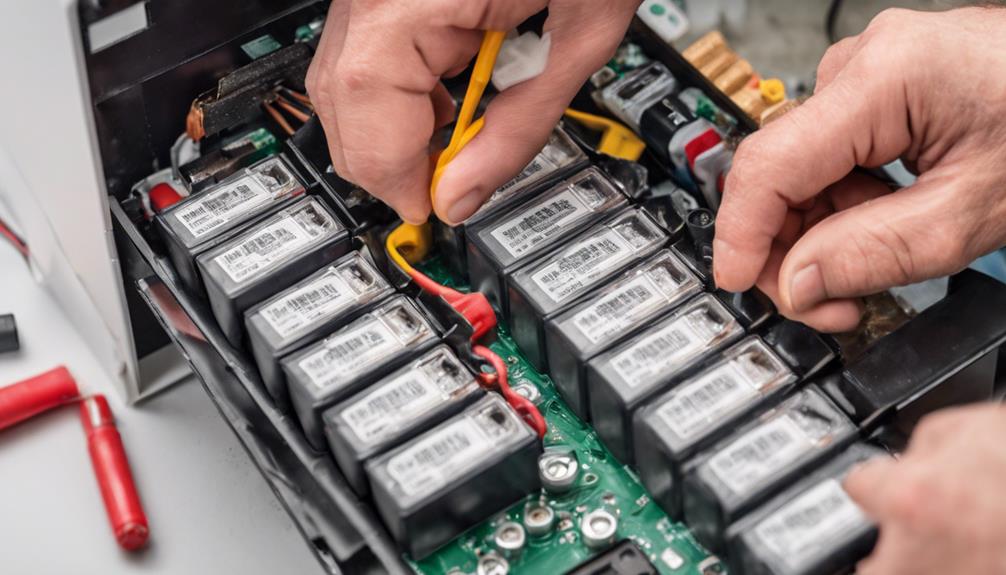
When it comes to your security system, understanding the battery life expectancy is essential. Recognizing the signs that indicate it's time for replacement is equally important. Additionally, knowing the proper disposal methods for old batteries is a key part of maintaining your system's functionality.
Battery Life Expectancy
Regularly checking and replacing batteries in your security system is essential to confirm its ideal functionality and reliability. To ascertain your security system stays powered up, consider the following:
- Battery Type: Use high-quality batteries suitable for your system.
- Check Frequency: Inspect batteries quarterly for signs of wear.
- Voltage Testing: Verify battery voltage levels annually.
- Replacement Timeline: Replace batteries every 3-5 years, depending on usage.
- Backup Batteries: Always have spare batteries on hand for emergencies.
Signs of Replacement
A crucial aspect of maintaining your security system involves recognizing the signs indicating the need for battery replacement. To guarantee your system operates smoothly, keep an eye out for replacement indicators such as frequent beeping, dimming keypad lights, or system malfunctions. Homes with security systems may qualify for insurance discounts, providing additional financial incentives for homeowners to invest in security measures. If you notice these signs, it's time to think about upgrading your batteries. Remember, proper maintenance not only keeps your security system functioning effectively but also enhances the overall security of your property. By staying proactive and addressing battery replacement promptly, you can avoid potential system failures and ensure that your security measures remain reliable. So, when your security system starts acting up, don't hesitate to look into upgrade options for improved performance.
Proper Disposal Methods
To guarantee the proper functioning of your security system and mitigate potential hazards, it is imperative to adhere to a structured battery replacement schedule. When it comes to disposing of old batteries, remember that eco-friendly disposal is not just a trend; it's a responsibility. Here are five tips to help you dispose of your security system batteries in an environmentally friendly way:
- Check with local recycling centers for battery drop-off locations.
- Look for retailers that offer battery recycling programs.
- Consider sending batteries back to the manufacturer for proper disposal.
- Invest in rechargeable batteries to reduce waste.
- Educate yourself on the potential environmental impacts of improper battery disposal.
Regular maintenance of your security system includes proper battery disposal to guarantee compliance with safety standards and protect the environment.
Understanding Lifespan Factors
Monitoring and understanding the factors that influence the lifespan of a security system is essential to its effective maintenance. When it comes to system upgrades, staying current with technology can prolong the life of your system. Outdated equipment may not be as efficient or secure. Environmental factors play a significant role as well. Extreme temperatures, humidity, and even dust can impact the performance and longevity of your security system. Ascertain that your system is installed in a suitable environment to prevent premature wear and tear. By considering these factors and taking appropriate measures, you can extend the lifespan of your security system and keep it functioning at peak performance for years to come.
Typical Lifespan of Alarms
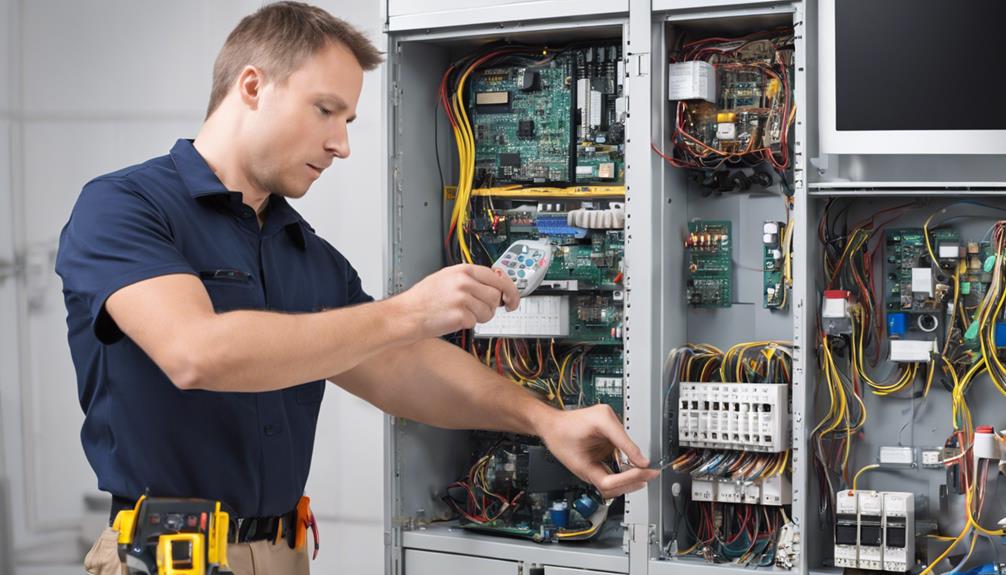
The typical lifespan of alarms is a crucial consideration when it comes to maintaining a reliable security system. When it comes to alarm technologies, here are some key points to keep in mind:
- Regular maintenance can greatly extend the lifespan of your alarms.
- The average lifespan of most alarm systems ranges from 5 to 10 years, with proper maintenance and care (Cost Overview of Residential Security Systems).
- Upgrading to newer alarm technologies can enhance system longevity.
- Environmental factors like humidity and temperature can impact alarm lifespan.
- Proper installation by trained professionals can guarantee peak performance and longevity of your alarms.
Typical Lifespan of Cameras
Considering the critical role of alarms in maintaining a secure environment, it is imperative to also understand the typical lifespan of security cameras. Camera technology has advanced markedly, but like all good things, cameras too have a lifespan. On average, security cameras can last between 5 to 10 years, depending on usage, maintenance, and environmental impact. Factors like extreme temperatures, humidity, and exposure to elements can affect the longevity of cameras. To extend their lifespan, guarantee regular cleaning, check for loose connections, and monitor environmental conditions. Upgrading to newer camera models can also enhance security measures, as newer technology often offers improved durability and features. So, keep an eye on your cameras – pun intended – to guarantee they are functioning ideally for a secure environment.
Enhancing home security with high-security deadbolts, such as high-security deadbolts, can further fortify your property against intruders.
Low Rate Locksmith's Services
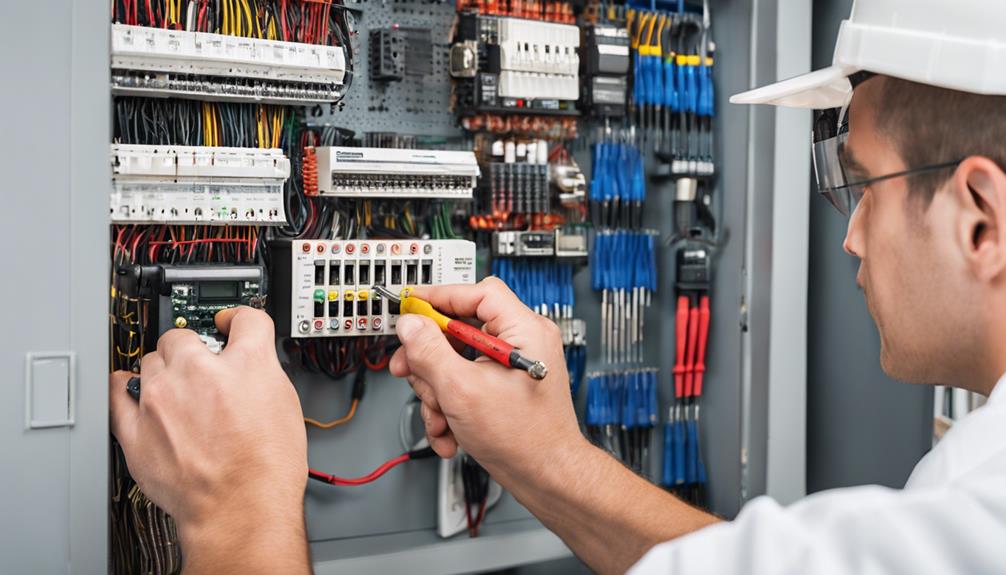
Looking to enhance the security of your property with professional locksmith services? Low Rate Locksmith offers exceptional solutions for all your security needs. Here are some key services they provide:
- 24/7 emergency access for lockouts
- Rekeying and key duplication services
- Installation of high-security locks
- Security system integration with smart locks
- Lock maintenance and repair
With Low Rate Locksmith, you can rest assured that your property is in safe hands. Whether you need help in an emergency or want to upgrade your security system, their expert locksmiths have got you covered. Don't compromise on your safety – trust the professionals at Low Rate Locksmith for all your locksmith service needs.
Extending Security System Longevity
To guarantee the longevity of your security system, regular maintenance and upkeep are essential. Think of your security system like a high-maintenance pet – it needs attention to thrive! Implementing preventive maintenance measures can considerably extend its lifespan. Enhancing your security system for modern needs is vital to staying ahead of potential security threats. Schedule regular check-ups to ascertain all components are functioning correctly and efficiently. Consider investing in security upgrades periodically to keep up with the ever-evolving technology and security threats. Upgrading your system not only enhances its performance but also increases its durability. Remember, a stitch in time saves nine, so don't wait for a security disaster to strike before taking action. By staying on top of preventive maintenance and embracing security upgrades, you'll keep your system in first-rate condition for years to come.
Conclusion
In summary, by staying vigilant with regular maintenance tasks and staying ahead of potential issues, you can prolong the lifespan of your security system and keep your home safe. Remember, a well-maintained security system is your first line of defense against intruders and threats. So, take the necessary steps to guarantee its longevity and effectiveness, giving you peace of mind knowing your property and loved ones are protected.

